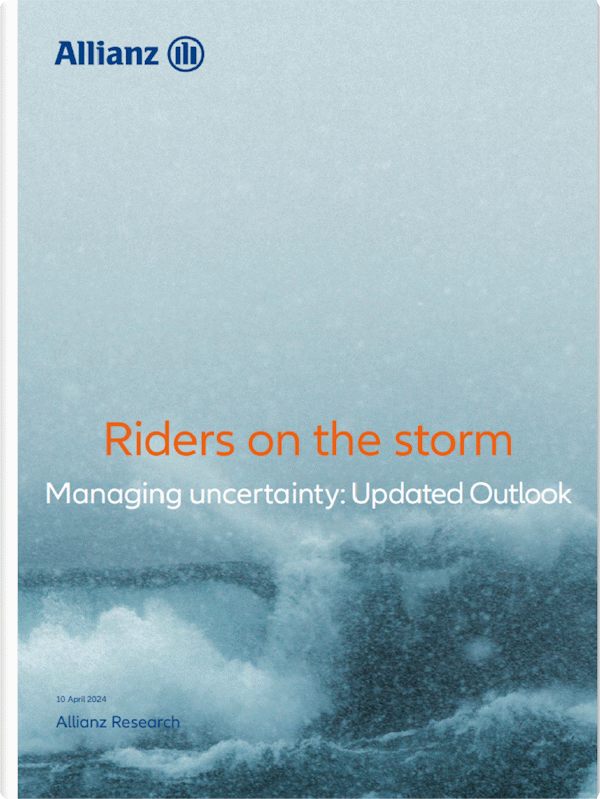With most tariffs paused for 90 days, governments are using this window to bolster key alliances and industries. However, businesses have to keep buying and selling goods, including with customers and suppliers in different parts of the world. Managing credit effectively and reducing unnecessary risks will be crucial to mitigating the impact of ongoing uncertainty in global trade.
Tariffs in the context of a slow global economy and increasing recession risks
Ostensibly designed to address trade imbalances, the US initially announced tariffs on over 50 countries with which they have the largest trade deficits, including steep taxes on Chinese imports. Apart from the latter, these have all been paused for 90 days. Excluding certain sectors (such as pharmaceuticals, semiconductors and key raw materials), the US tariff rate on China stands at 130%, while the EU faces a 9% rate.
The trade war threatens to raise production costs for companies, and brings an additional layer of uncertainty in a period of low growth, persistent inflation, and diminished consumer demand as some consumers might not be able to cope with the increase in prices.
Already weak since the Covid-19 pandemic, we expect global GDP growth to slump to 2.3%, and for the United States to enter a mild recession (+0.8% in 2025, with a cumulative decline of -0.5% Q1-Q3), due to import tariff hikes and retaliatory measures from China. Inflation is expected to peak at 4.3% in the US by the summer, and the Federal Reserve is likely to maintain interest rates in place until later in the year to reduce the risk of stagflation. Consumer confidence, the economic engine of the US, is in the doldrums as households cut back on spending and prioritize saving.
So, what does this mean for other countries?
In response to the tariffs, governments and trading blocs are adopting a multi-pronged approach. These include retaliatory measures such as reciprocal tariffs, fiscal stimulus programs, diversifying imports, and drafting bilateral deals. Based on the current situation, we assume that bilateral deals could lower the US import tariff rate to 10.2% by Q4 2025.
Certain emerging markets, such as Vietnam, India, Israel and Thailand, are seeking trade agreements, cutting tariffs, or increasing imports – in short, offering the US incentives to deepen relations in exchange for more favorable import terms. Countries which have high export dependency on the US, such as Cambodia, Taiwan, South Korea, Mexico and Colombia, are keen to protect markets for their goods. They are more likely to negotiate, and commit to buying more US products and increasing investments in the US where possible.
China’s economic recovery in Q1 and consumption-focused reforms and stimulus, enable its bolder response to tariffs. As of April 10, all US imports are subject to +97pps tariffs, with potentially more to come. The EU was also planning to respond with retaliatory measures, imposing 25% tariffs on dozens of goods in waves starting in April as a first step, targeting various symbolic agricultural and industrial goods.
Managing uncertainty in the fog of a trade war
While uncertainty is high and capital expenditure is low, companies can use various short- and mid-term strategies to mitigate risk. Based on shipping data, we’ve noticed that US companies have stockpiled goods, estimated to cover six months’ worth of demand, especially in retail goods and consumer electronics. As tariffs push prices up, not all companies can absorb rising costs of production: two-thirds of businesses may pass these on to consumers, notably those with lower margins. But the risk of losing market shares and not being able to diversify on other export markers is increasing, and with that the risk of getting insolvent.
In the mid-term, companies are also considering shifting production, whether it’s from China to Southeast Asia and Mexico to avoid the steepest tariffs, or even to the US despite higher labor costs. Chinese companies will continue to reroute from other markets to avoid steep US tariffs. Emerging regional trade hubs , such as Malaysia, Vietnam, Indonesia, the Philippines, and the UAE, are set to benefit from companies’ more diverse supply chains.
It's precisely these kinds of economic conditions that highlight the value of a global trade partner. At Allianz Trade, our team of economists regularly updates country and sector risk profiles, and publishes research reports on structural and emerging macroeconomic trends. With offices in over 40 countries around the world, we provide our customers with insight on the risks and opportunities in their sector, region and supply chain, so they in turn are equipped to make the best decisions for their business.
Connect with our expert ↓

Ana Boata
Head of Economic Research
Allianz Trade
We’ll be happy to answer your questions.

Our expertise and commitment
Allianz Trade is the global leader in trade credit insurance and credit management, offering tailored solutions to mitigate the risks associated with bad debt, thereby ensuring the financial stability of businesses. Our products and services help companies with risk management, cash flow management, accounts receivables protection, Surety bonds, business fraud Insurance, debt collection processes and e-commerce credit insurance ensuring the financial resilience for our client’s businesses. Our expertise in risk mitigation and finance positions us as trusted advisors, enabling businesses aspiring for global success to expand into international markets with confidence.
Our business is built on supporting relationships between people and organizations, relationships that extend across frontiers of all kinds - geographical, financial, industrial, and more. We are constantly aware that our work has an impact on the communities we serve and that we have a duty to help and support others. At Allianz Trade, we are strongly committed to fairness for all without discrimination, among our own people and in our many relationships with those outside our business.














